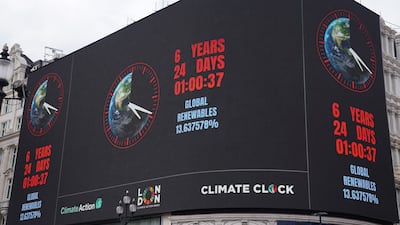A defining aspect of climate change is its universality. Although it disproportionately affects poorer nations, global warming leaves no part of our planet untouched. It stands to reason, therefore, that action to mitigate it, to help afflicted communities and to transition to a cleaner, greener economy also needs to be worldwide.
This has been reflected in comments coming out of a high-level climate event in the UK this week. London Climate Action Week heard from Sheikha Shamma bint Sultan, the president and chief executive of the UAE Independent Climate Change Accelerators, who made the apt observation that a borderless approach is needed to tackle the problems posed by global warming.
“Currently, there is a $3 trillion to $3.5 trillion gap in annual investment made towards the UN Sustainable Development Goals and climate in developing countries,” she told the Climate Investment Summit at the London Stock Exchange. “This will simply not be achievable if we continue to work in silos.”
The borderless approach Sheikha Shamma envisioned – something she termed “radical collaboration” – would include all sectors, and ensure that the voices of young people, women and marginalised communities are heard. This is an important dynamic to maintain as the world gets ready for Cop28 in the UAE later this year.
However, this requirement for unity is matched also by the need to balance urgency and optimism in the climate fight. Speaking on the opening day of the London event earlier this week, Razan Al Mubarak, the UN Climate Change High-Level Champion for Cop28, warned against climate conversations “drowning in the doom and gloom”.
Emphasising “communication, with collaboration”, Ms Al Mubarak rightly pointed out that “you will not have a green transition without a socio-cultural transition underpinning it”. To push forward this societal change, people will need to feel that all is not lost, that they have agency in this crisis and that their actions, no matter how small, can play a positive role.
Luckily, there are plenty of examples of progress to draw upon. The UN has said that human action to repair the planet’s ozone layer is working, and this protective shield above the Earth that absorbs ultraviolet radiation from the Sun could recover in decades. Earlier this month, Swiss citizens voted to adopt laws to tackle climate-change laws. Meanwhile, demand for electric cars is booming, with sales expected to leap 35 per cent this year after a record-breaking 2022, according to the International Energy Agency. Closer to home, this week the UAE agreed on closer co-operation with the UK to keep global warming targets within reach.
But those targets still need to be in people’s minds. In London this week, Britain’s King Charles III presided over the inauguration of a countdown clock that will mark the deadline set in the 2015 Paris Agreement to limit global temperature rises to less than 1.5°C above pre-industrial levels. Dr Sultan Al Jaber, Cop28 President-designate, also attended the event. Dr Al Jaber has said a key goal of Cop28 is to keep this target within reach. It is a prudent presentation of the fact that there is not an infinite amount of time to put the brakes on global warming.
King Charles and Dr Al Jaber were also involved in a round-table event at London's Guildhall with key leaders on climate action. There, Pascal Soriot, chief executive of AstraZeneca, said pollution and climate change were claiming millions of lives each year.
“And some people would think OK, well this is something that is happening in faraway countries due to flooding, drought, extreme temperatures,” he added, “but it is actually here, it’s affecting us all.”
The work being done in London and at other international climate events should go some way to building up the unity required before Cop28 begins in earnest. More engagement means more people breaking out of the “silos” that Sheikha Shamma referred to, and that can only be a good thing.


